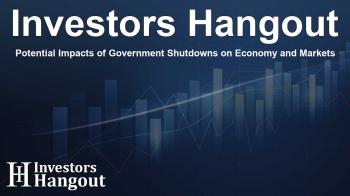Potential Impacts of Government Shutdowns on Economy and Markets

Understanding the Government Shutdown and Its Implications
The U.S. federal government recently began a shutdown, prompting concerns about its effect on markets and various sectors. This situation arose when an agreement on the spending plan could not be reached. While shutdowns typically create uncertainty, historical trends suggest that they can be short-lived and are not usually detrimental to equities in the long run.
The Nature of Government Shutdowns
Historically, government shutdowns are not a reason for investors to panic. Since 1976, there have been twenty shutdowns, averaging about eight days in duration. Past performances show that while some volatility may accompany these events, markets tend to rebound swiftly. Investors typically look beyond these political disruptions, and many have observed strong market performance following a shutdown.
Market Resilience Following Shutdowns
- The S&P 500 has consistently posted an average progression of approximately 1.2% one month after a budget agreement and 2.9% three months later.
- One year after a shutdown concludes, the S&P 500 often sees an average growth of 13%, with 86% of instances showing an upward trend.
The Threat of Economic Data Suspension
One of the most pressing issues during a government shutdown is the suspension of key economic data, a phenomenon often referred to as a "data blackout". The Bureau of Labor Statistics is not able to collect or release crucial data during this time, causing the delay of significant reports, such as job statistics.
The Challenges Posed by Data Blackouts
This gap in economic reporting is particularly unsettling for both investors and the Federal Reserve, as it clouds the economic forecast. Investors, as well as economists, rely heavily on these reports for making informed decisions. Delays in crucial data collections can create substantial challenges in assessing economic health.
The Impact of Shutdown Duration on the Economy
The length of a government shutdown plays a critical role in determining its economic impact. Short shutdowns generally have little negative influence; however, prolonged closures can impede economic growth considerably. Beyond halting government spending, shutdowns jeopardize paychecks for federal workers and disrupt various private businesses reliant on government services.
Historical Data on Economic Growth
- For example, a 16-day shutdown in 2013 led to a decrease in annualized GDP growth by as much as 0.6%, according to fiscal analyses.
Effect on Services and Federal Institutions
During a government shutdown, several critical services and federal institutions face closures or reduced operation capabilities. For instance, military employees generally do not receive payment during these periods, and national parks may close their doors, affecting significant visitor traffic. While Social Security benefits continue, other departments, such as the IRS, might function on a minimal basis.
Critical Services Impacted by Shutdowns
- Military personnel may not receive remuneration.
- National parks suspend operations, affecting tourism.
- The IRS and Labor Department operate with limited resources, resulting in lack of support for consumers.
- The FDA ceases processing new drug applications during these closures.
- Supplemental Nutrition Assistance Program (SNAP) benefits are extended only for a month.
Current Market Trends
Recent transactions indicate that the SPDR S&P 500 ETF Trust (NYSE: SPY) and Invesco QQQ Trust ETF (NASDAQ: QQQ), reflecting the performance of the S&P 500 and Nasdaq 100 indices, have seen minor fluctuations amidst the shutdown news. As of the latest reports, SPY gained 0.38%, while QQQ saw an increase of 0.27%.
Responding to Market Conditions
Despite these trends, the futures of major indices like the S&P 500 and Dow Jones saw declines using early indicators. Thus, market observers remain watchful, analyzing potential investment opportunities amid the prevailing uncertainties.
Frequently Asked Questions
What happens during a government shutdown?
During a government shutdown, federal operations pause, affecting various services and employees. Essential services may continue, but many employees may not be paid.
How often do government shutdowns occur?
Government shutdowns have occurred twenty times since 1976, lasting an average of eight days.
What is the historical impact of shutdowns on the stock market?
Historically, the stock market has shown resilience after shutdowns, often recovering quickly and seeing positive growth in the months following.
How does a shutdown affect federal employees?
Many federal employees may be furloughed and not receive pay. Some critical staff, however, may still be required to work without immediate compensation.
What key economic reports are delayed during shutdowns?
Shutdowns lead to delays in significant economic reports, such as employment statistics and other essential economic data, impacting investor decision-making.
About The Author
Contact Dylan Bailey privately here. Or send an email with ATTN: Dylan Bailey as the subject to contact@investorshangout.com.
About Investors Hangout
Investors Hangout is a leading online stock forum for financial discussion and learning, offering a wide range of free tools and resources. It draws in traders of all levels, who exchange market knowledge, investigate trading tactics, and keep an eye on industry developments in real time. Featuring financial articles, stock message boards, quotes, charts, company profiles, and live news updates. Through cooperative learning and a wealth of informational resources, it helps users from novices creating their first portfolios to experts honing their techniques. Join Investors Hangout today: https://investorshangout.com/
The content of this article is based on factual, publicly available information and does not represent legal, financial, or investment advice. Investors Hangout does not offer financial advice, and the author is not a licensed financial advisor. Consult a qualified advisor before making any financial or investment decisions based on this article. This article should not be considered advice to purchase, sell, or hold any securities or other investments. If any of the material provided here is inaccurate, please contact us for corrections.

